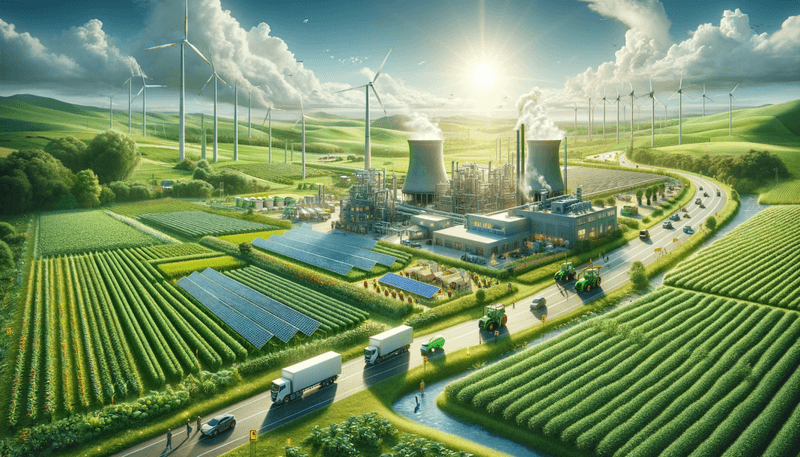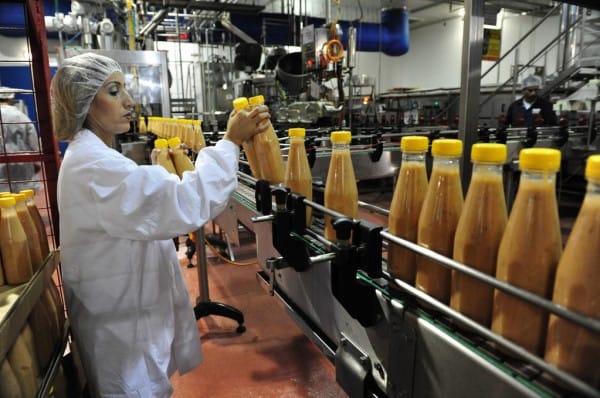Green Beverage Production: Practices for a Sustainable Future
In today’s environmentally conscious market, sustainability is not just a trend but a necessity for the beverage industry. Sustainable practices in beverage production can significantly reduce the environmental impact, conserve resources, and meet the growing consumer demand for eco-friendly products. This guide explores in-depth sustainable beverage production practices, highlighting innovative methods and technologies that ensure efficiency and sustainability from sourcing raw materials to packaging the final product.

Understanding the Importance of Sustainability in Beverage Production
Sustainability in beverage production involves implementing practices that minimize environmental impact, reduce waste, and conserve natural resources. It addresses critical issues such as water and energy consumption, carbon emissions, waste generation, and the use of sustainable materials. For beverage companies, adopting sustainable practices is essential for complying with regulations, reducing costs, enhancing brand reputation, and meeting consumer expectations for greener products.
Responsible Sourcing: A Sustainable Approach to Raw Materials
The quest for sustainability commences with conscientious sourcing of raw materials. Beverage companies are embracing this ethos by increasingly turning towards sustainable agricultural practices to ensure that their ingredients are cultivated with the utmost care for our planet. This entails a commitment to supporting organic farming, fair trade, and the utilization of locally-sourced ingredients, all aimed at minimizing environmental impact and promoting ecological harmony.
Organic farming represents a pivotal shift away from synthetic pesticides and fertilizers, fostering soil vitality and safeguarding biodiversity. Concurrently, fair trade principles guarantee equitable compensation for farmers and uphold safe working conditions, thereby fostering community empowerment and long-term economic resilience. Moreover, the emphasis on locally-sourced ingredients not only curtails carbon emissions associated with transportation but also serves as a cornerstone for nurturing vibrant local economies.
Optimising Water Usage for Sustainability
Water plays an indispensable role in beverage manufacturing, involved in every stage from ingredient processing to equipment maintenance. Therefore, implementing efficient water management practices is imperative for sustainable operations. Advanced technologies for water recycling and treatment offer promising avenues for reducing water consumption and waste.
Recycling systems that treat and repurpose water within the production cycle effectively curtail the need for fresh water. Cutting-edge methods like membrane filtration, ultrafiltration, and reverse osmosis play pivotal roles in purifying water for subsequent reuse. Furthermore, embracing water-efficient equipment and processes, such as dry cleaning methodologies for bottles and cans, serves to minimize reliance on water resources while maximizing sustainability efforts.
Empowering Sustainability through Energy Efficiency and Renewable Resources
In the pursuit of sustainability, energy consumption emerges as a pivotal focus within the realm of beverage production. To champion this cause, companies are actively investing in technologies that promote energy efficiency and harness renewable energy sources. This encompasses a multifaceted approach, from the adoption of energy-efficient machinery and streamlined production processes to the integration of renewable energy options such as solar, wind, and bioenergy.
Upgrading to energy-efficient machinery not only diminishes energy consumption but also translates into tangible reductions in operational costs. Concurrently, the optimization of production processes ensures that energy waste is minimized, further bolstering efficiency measures. Moreover, the deployment of on-site renewable energy installations, such as solar panels or wind turbines, serves as a beacon of sustainability by significantly offsetting the demand for fossil fuels and thereby mitigating carbon emissions.

Championing Waste Reduction and Sustainable Management
Waste reduction stands as a cornerstone of sustainable beverage production, demanding meticulous attention at every phase of the manufacturing process alongside the implementation of robust waste management protocols. Companies are embracing the ethos of zero waste, striving to ensure that all byproducts find purpose through reuse, recycling, or composting, thus eliminating the need for landfill disposal.
Recyclable materials, such as glass, aluminium, and certain plastics, can be reprocessed into new packaging, reducing the need for virgin materials. Biodegradable and compostable packaging, made from materials like cornstarch or sugarcane, break down naturally, reducing plastic pollution. Lightweight packaging designs reduce material use and transportation emissions, further enhancing sustainability.
Carbon Footprint Reduction
Reducing the carbon footprint is a primary goal in sustainable beverage production. This involves strategies to lower greenhouse gas emissions at every stage of the production process. Companies are adopting practices such as improving energy efficiency, using renewable energy, optimizing logistics, and implementing carbon offset programs.
Energy-efficient processes and machinery reduce the carbon footprint of production. Renewable energy sources provide clean power, cutting down on fossil fuel usage. Optimizing logistics through route planning and fuel-efficient transportation reduces emissions from distribution. Carbon offset programs, where companies invest in projects that reduce or capture carbon emissions, help to neutralize their overall carbon footprint.
Uplifting Sustainability through Innovative Product Development
In the realm of product development, sustainability emerges as a compelling frontier for beverage companies seeking to redefine the essence of delight while championing environmental stewardship. Through substantial investments in research and development, these companies endeavor to craft beverages that not only tantalize the taste buds but also embody eco-consciousness at their core. This encompasses a spectrum of initiatives, from formulating beverages with natural ingredients and reducing sugar content to sourcing flavourings and colorings from sustainable origins.
The creation of novel beverages that demand minimal processing and fewer resources stands as a beacon of innovation, poised to diminish the overall ecological footprint of production. Furthermore, the introduction of plant-based beverages and the gradual reduction of reliance on animal-derived ingredients hold immense promise in the journey towards sustainability, owing to the inherently lower resource intensity associated with plant-based alternatives.
Empowering Consumers through Education and Engagement
Fostering awareness among consumers regarding the significance of sustainability in beverage production stands as a pivotal catalyst for driving transformative change. Beverage companies can cultivate this awareness through a multifaceted approach, encompassing transparent labeling practices, sustainability certifications, and enlightening educational campaigns that illuminate the environmental merits of their offerings.
By furnishing consumers with insights into sustainable practices and the profound ramifications of their purchasing decisions, companies wield the power to nurture a cadre of informed consumers. Armed with knowledge, these individuals are empowered to make conscientious choices that align with their values and aspirations for a greener future. Moreover, by fostering genuine engagement and dialogue around sustainability, companies can forge enduring connections with their customer base, nurturing a collective ethos of responsibility and stewardship that transcends mere consumption.

Amplifying Sustainability through Collaborative Partnerships
In the pursuit of sustainability, forging collaborative alliances with like-minded organizations, industry consortia, and non-profit entities emerges as a potent strategy for effecting transformative change. These partnerships serve as conduits for the pooling of resources, exchange of expertise, and co-creation of industry-wide standards and best practices.
Through concerted efforts, joint initiatives such as collective recycling programs or collaborative renewable energy projects can exponentially magnify the efficacy of individual endeavors, fostering a ripple effect of positive impact across the ecosystem. Moreover, collaborations with esteemed research institutions offer fertile ground for the cultivation of innovative solutions and the cultivation of breakthroughs in sustainable production technologies, thereby propelling the industry towards a more sustainable and resilient future.
Nurturing Communities through Social Responsibility
In the realm of sustainable beverage production, the ethos extends beyond environmental stewardship to encompass social responsibility and community engagement. Companies can make meaningful contributions to local communities by prioritizing practices that uphold fair labor standards, support local economies through ingredient sourcing, and ensure safe and equitable working conditions for all.
Engagement in community development initiatives, whether through infrastructure projects or educational support, serves to amplify the social impact of sustainable practices, fostering a cycle of empowerment and prosperity. By aligning corporate social responsibility endeavors with sustainability goals, companies forge deeper bonds with their communities, laying the groundwork for enduring partnerships that yield mutually beneficial outcomes over the long term.
Closing Thoughts: Creating a Sustainable Future
In order to satisfy customer needs and environmental constraints, sustainable beverage production is necessary. Beverage firms can attain noteworthy sustainability milestones through the use of responsible sourcing, efficient use of water and energy, waste reduction, sustainable packaging, and carbon footprint reduction. These initiatives are further strengthened by innovative approaches to product creation, customer education, partnerships, and community involvement. Making the switch to sustainable practices ensures long-term success in a cutthroat market by improving operational efficiency, brand reputation, and environmental benefits. Beverage firms can set the standard for a more sustainable future by putting sustainability first and striking a balance between environmental stewardship and profitability.